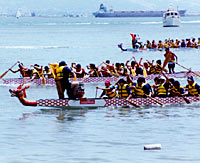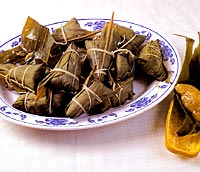The Dragon Boat Festival, the 5th day of the 5th lunar month, has had a
history of more than 2,000 years. It is usually in June in the Gregorian
calendar.

There are many legends about the evolution of the
festival, the most popular of which is in commemoration of Qu Yuan (340-278 BC).
Qu Yuan was minister of the State of Chu and one of China's earliest poets. In
face of great pressure from the powerful Qin State, he advocated enriching the
country and strengthening its military forces so as to fight against the Qin.
However, he was opposed by aristocrats headed by Zi Lan, and later deposed and
exiled by King Huai. In his exiled days, he still cared much for his country and
people and composed immortal poems including
Li Sao (
The Lament),
Tian Wen (
Heavenly Questions) and
Jiu Ge (
Nine
Songs), which had far-reaching influences. In 278 BC, he heard the news that
Qin troops had finally conquered Chu's capital, so he finished his last piece
Huai Sha (
Embracing Sand) and plunged himself into the Miluo
River, clasping his arms to a large stone. The day happened to be the 5th of the
5th month in the Chinese lunar calendar. After his death, the people of Chu
crowded to the bank of the river to pay their respects to him. The fishermen
sailed their boats up and down the river to look for his body. People threw into
the water
zongzi (pyramid-shaped glutinous rice dumplings wrapped in reed
or bamboo leaves) and eggs to divert possible fish or shrimp from attacking his
body. An old doctor poured a jug of reaglar wine (Chinese liquor seasoned with
realgar) into the water, hoping to turn all aquatic beasts drunk. That's why
people later followed the customs such as dragon boat racing, eating
zongzi and drinking realgar wine on that day.
Dragon boat racing is an indispensable part of the festival, held all over
the country. As the gun is fired, people will see racers in dragon-shaped canoes
pulling the oars harmoniously and hurriedly, accompanied by rapid drums,
speeding toward their destination. Folk tales say the game originates from the
activities of seeking Qu Yuan's body, but experts, after painstaking and
meticulous research, conclude that dragon boat racing is a semi-religious,
semi-entertaining program from the Warring States Period (475-221 BC). In the
following thousands of years, the game spread to Japan, Vietnam and Britain as
well as China's Taiwan and Hong Kong. Now dragon boat racing has developed into
an aquatic sports item which features both Chinese tradition and modern sporting
spirit. In 1980, it was listed into the state sports competition programs and
has since been held every year. The award is called "Qu Yuan Cup."
 Zongzi
Zongzi is an essential food of the Dragon Boat
Festival. It is said that people ate them in the Spring and Autumn Period
(770-476 BC). In early times, it was only glutinous rice dumplings wrapped in
reed or other plant leaves and tied with colored thread, but now the fillings
are more diversified, including jujube and bean paste, fresh meat, and ham and
egg yolk. If time permits, people will soak glutinous rice, wash reed leaves and
wrap up
zongzi themselves. Otherwise, they will go to shops to buy
whatever stuff they want. The custom of eating
zongzi is now popular in
North and South Korea, Japan and Southeast Asian nations.
On Dragon Boat Festival, parents also need to dress their children up with
a perfume pouch. They first sew little bags with colorful silk cloth, then fill
the bags with perfumes or herbal medicines, and finally string them with silk
threads. The perfume pouch will be hung around the neck or tied to the front of
a garment as an ornament. They are said to be able to ward off evil.
Pages from
www.victortex.com


没有评论:
发表评论